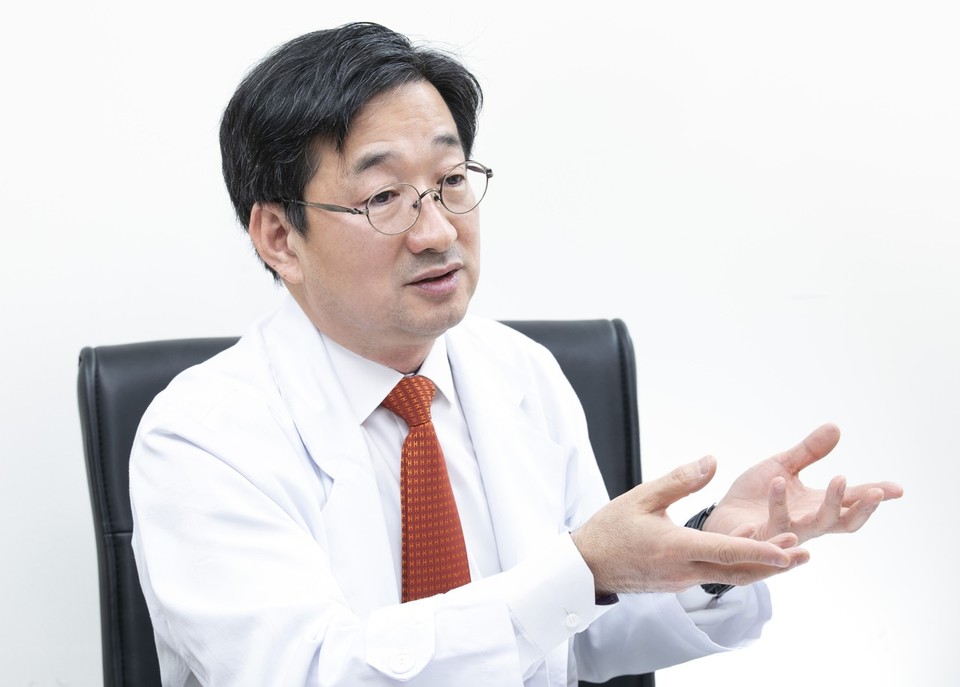The domestic medical system's burden has been increasing due to the prolonged fight against the unprecedented Covid-19 pandemic.
Establishing infrastructure in response to the new coronavirus has overloaded the existing healthcare systems at hospitals, causing delayed diagnosis, treatment, hospitalization, surgery, and examination.
Particularly, visits to emergency rooms have often been restricted depending on the patient's fever regardless of the disease's severity. Cancer patients with life-threatening conditions were no exception.
Korea Biomedical Review met with Oncology Professor Kim Tae-won at Asan Medical Center, also chairman of the Korean Society of Medical Oncology (KSMO), to learn more about the impacts of prolonged Covid-19 on domestic cancer treatment and explore expected problems to arise in the future.

Question: How are cancer patients receiving treatments amid the spread of Covid-19?
Answer: I believe the nation has dealt with the pandemic relatively OK so far compared to the U.S. and European countries. Based on accumulated experiences in the past year, the central and local governments and medical institutions have responded well according to the guidelines. Thanks to such efforts, problems linked to delayed treatment and diagnosis of cancer patients and the life expectancy, which recently surfaced as a national issue, were fewer than expected.
However, the prolonged Covid-19 and increased number of infections gradually affected the diagnosis and treatment, palliative care, and emergency room visits for cancer patients. This is because the increasing workforce responding to Covid-19 in each hospital causes delayed surgery or lack of hospital rooms, taking more time for hospitalization and biopsy.
The emergency room visits are a more serious issue. Cancer patients with fever are not distinguishable from those with the coronavirus, forcing hospitals to send them back. Similar things happen in outpatient care. Patients receiving palliative care due to poor conditions need long-term treatment at a nursing hospital, but some of them refuse to be hospitalized for fear of infection. From now on, it is necessary to observe the related data with care.
There are reports on declining cancer diagnosis recently. Nothing shows this better than the data on policy for providing expanded coverage to cancer patients registered with the National Health Insurance Service (NHIS).
According to the NHIS data, fewer cancer patients were registered in 2020 than the previous year. The number of patients diagnosed with cancer between March and May, when the Covid-19 began sweeping the nation, decreased by 17 percent from the same period of 2019. The number for the January-September period also fell by 2.6 percent year on year. Experts believe that the decreasing trend is due to delayed diagnosis caused by Covid-19, rather than a reduced number of actual patients.
Q: Can we say some patients miss the proper treatment period due to delayed diagnosis?
A: Yes. The diagnosis of gastric cancer showed the largest drop of 11 percent, according to NHIS' data on cases of cancer patients who received expanded health insurance coverage. Gastric cancer diagnosis seems to have been affected more by Covid-19 than other tests, as patients have to visit hospitals and take endoscopy. Following the stomach cancer were colorectal and lung cancer.
Besides, fewer people received the national cancer screening service. The screening rate for the first 10 months of 2020 dropped by about 10 percent compared with the same period of 2019. The February-April figure even dropped by half. In response, the government temporarily extended the inspection period until June 2021. The number of patients visiting hospitals for private checkups also decreased.
Q: Based on your experience, would a six-month delay in diagnosis change the stage of cancer?
A: Of course, it could. A Hallym University Medical Center study showed that the number of inoperable patients with stage-4 lung cancer reported between February and June increased 12 percent over the past three years. Although the study only has a limited data of three to four months, I believe there would be many more patients who developed into later stages nationwide.
Excess deaths caused by delayed diagnosis are belatedly appearing along with emergency room shortage. There is a concern about excessive deaths, considering the decrease in screening and patients diagnosed with cancer.
Q: Are there cancer patients who desire to postpone their therapy due to Covid-19?
A: Yes, some of my patients said they would receive treatment later due to their fear of the pandemic. A Canadian study published in the British Medical Journal also found a significant difference in survival rates among those who received a belated diagnosis, surgery, chemotherapy.
The risk of death increased by 6 to 8 percent every four-week delay of surgery in seven major cancers, including bladder, breast, rectal, colon, lung, cervix, and head and neck cancer, indicating that patients require a timely examination and treatment.
Early detection of cancer is critical, but it is difficult to do so when people avoid health checkups. The concern may not be so serious if this problem is just the case of 2020, but we have to keep in mind that the Covid-19 can last another year. If people hold off examination, health checkup, and private assessment, they may miss the right time of treatment for lung or pancreatic cancers that advance into late stages rapidly.
Q: Korea has announced to begin vaccination in February, and the discussion on priorities is in full swing. The American Association for Cancer Research (AACR) has recently emphasized that cancer patients are just as vulnerable to Covid-19 as the elderly population and recommended to place them in the first line of the immunization program. What are domestic cancer associations' thoughts?
A: Recently, AACR and the European Society for Medical Oncology (ESMO) published several guidelines for Covid-19 vaccination. However, we still lack sufficient information on guidelines for cancer patients. These guides recommend people with impaired immunity to get Coivd-19 shots without specifying cancer patients. Although Europe and the U.S. placed importance slightly differently, they prioritized senior citizens, elderly patients in nursing homes, and medical workers in order. I believe Korea would do the same.
The government should set the priorities after carefully considering the vaccine procurement and medical and policy aspects. KSMO is preparing domestic guidelines by referring to the situation in the U.S. and Europe, and we will soon begin the work with ESMO. We believe the procedures to be ready by the end of the second quarter.

Q: Do you have comments for patients fighting against cancer amid the Covid-19 pandemic?
A: Cancer patients are worried as they have to fight two diseases. They face situations where they could not be hospitalized for biopsy, delayed surgery schedule, or their healthcare providers getting quarantined even with a determined operation date.
It is especially unfortunate for those who came from other regions. Cancer patients with fever are more worried and hard-pressed when even healthy people feel very nervous until they see Covid-19 results.
Many cancer patients are older people and feel anxious about hospitalization because they can have only one guardian. These patients would have met friends and get encouraged usually, but that is not the case due to the Covid-19. It is a pity that patients in hospice care for not having the chance to spend the precious last moment of life with their families. Both patients receiving oncology treatments for a full recovery and those preparing to part ways are having a hard time.
Some cancer patients neglect the Covid-19 pandemic too much, and some take it too seriously and postpone treatment or examination. I want to advise that patients need to be examined and treated on time as various data have shown that delayed diagnosis or therapy makes a big difference in the outcomes. Patients should consult their doctors and receive a referral to be treated in nearby clinics if they are in a difficult situation to visit hospitals or adjust the number of visits according to the condition to prevent void in treatment.

